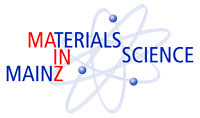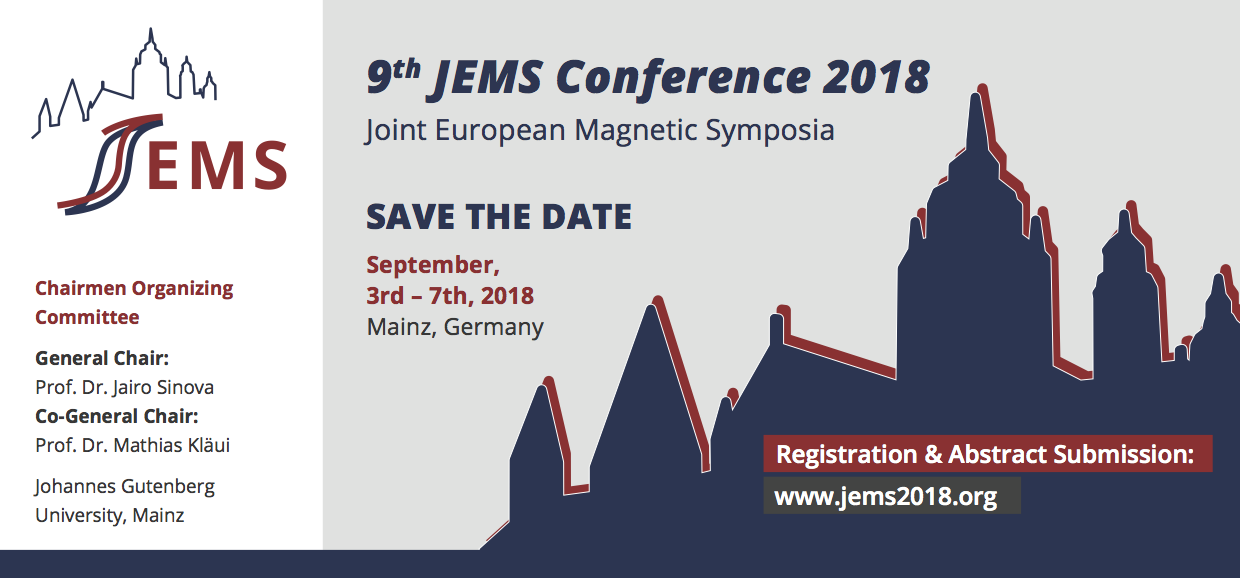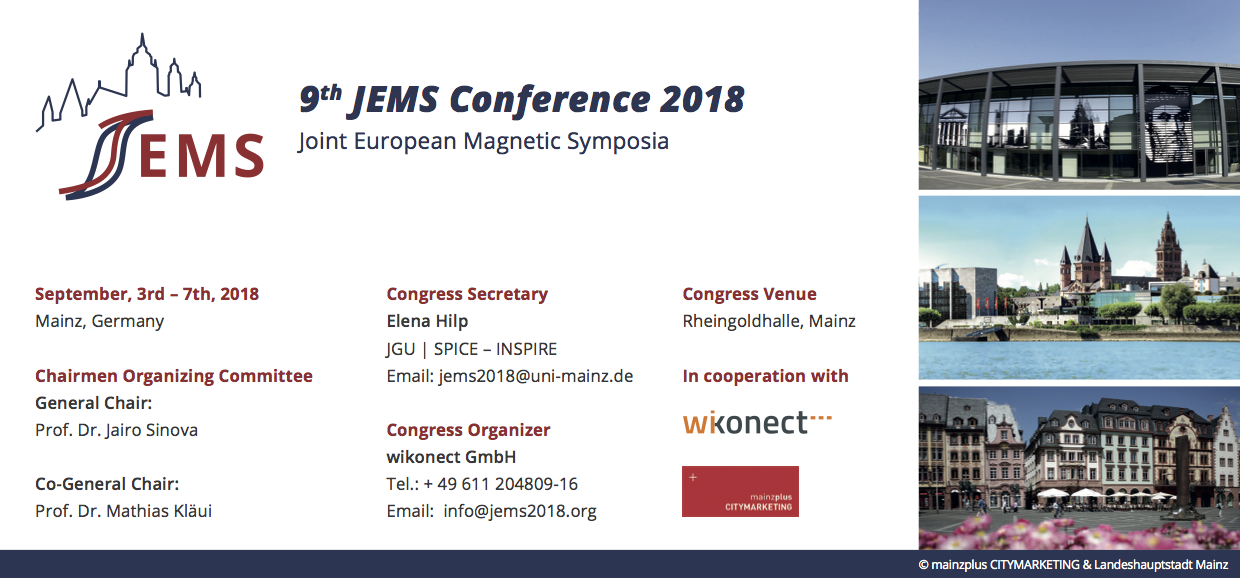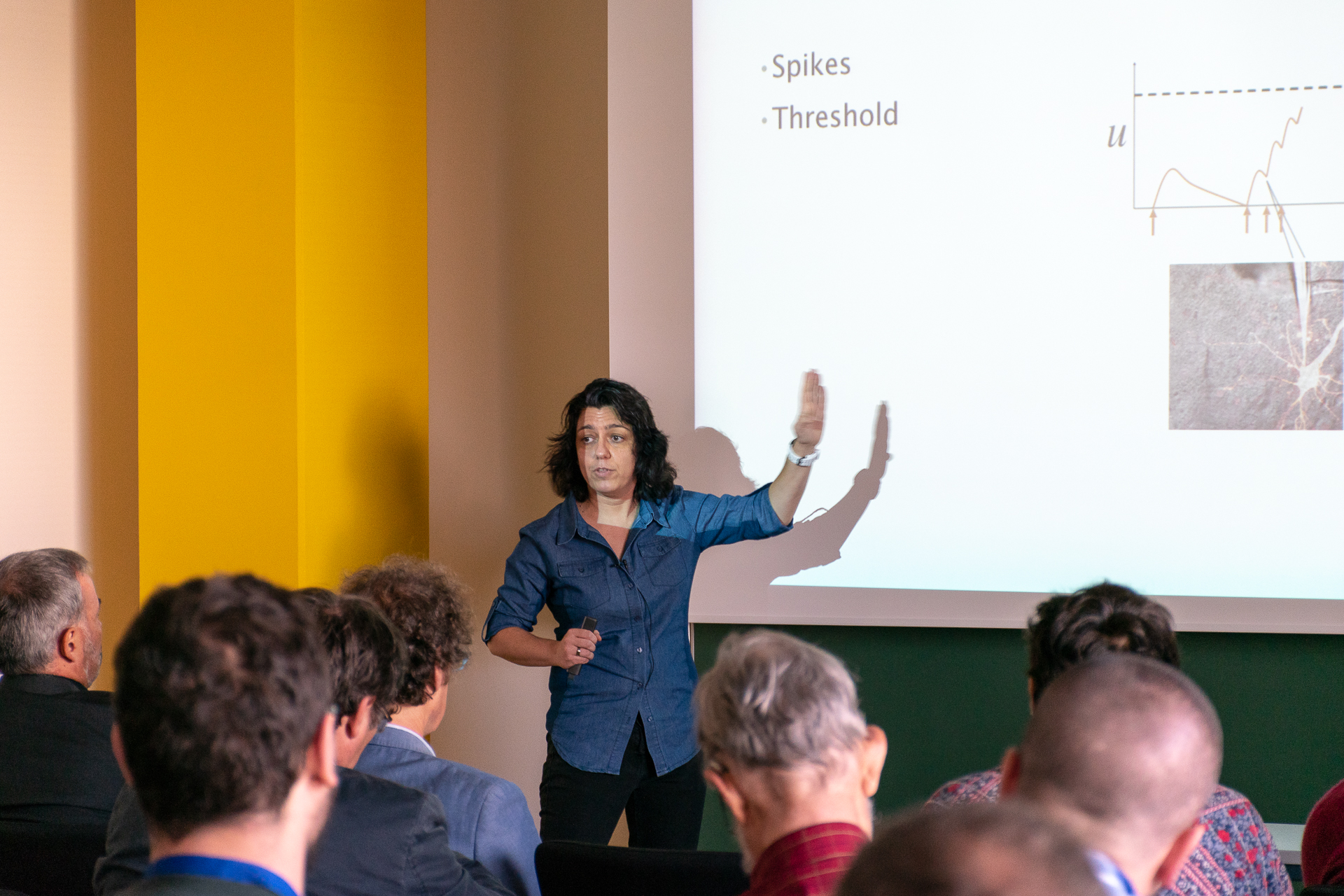Young Research Leaders Group Workshop:
Collective phenomena in driven quantum systems
Mainz, Germany: July 10th - 13th 2018
- To Image 1
- To Image 2
- To Image 3
- To Image 4
- To Image 5
- To Image 6
- To Image 7
The workshop will explore situations in which non-equilibrium setups can provide information about many-body systems that cannot be accessed in conventional (linear-response based) probes. Systems of particular interest are materials with strongly competing or frustrated (by disorder, relativistic corrections or geometrical constrains) interactions, or those under extreme quantum conditions (traditionally, very low temperatures and/or very high magnetic fields). These circumstances favor the formation of phases characterized by some sort of topological order, revealing highly entangled ground states and exotic, but experimentally elusive, excitations. Topology provides also the unifying framework to describe the emergence of quantum coherence at the macroscopic scale. These current efforts in solid state goes hand by hand with the design and large-scale control of new types of synthetic quantum matter in driven optical and atomic systems. With this multidisciplinary philosophy in mind, the workshop aims to bring together researchers with expertise in frustrated magnetism, mesoscopic physics (including the quantum Hall effect, Weyl/Dirac semimetals, layered semiconductors and spintronic interfaces), cold atoms, and optical cavities.
Organizers
Ana Asenjo-Garcia (Caltech)
Héctor Ochoa (UCLA)
Kyoung-Whan Kim (Mainz)
Participants
Monika Aidelsburger, LMU München
Monica Allen, Stanford
Mitali Banerjee, Weizmann
Michael Buchhold, Caltech
Benedetta Flebus, UCLA
Adolfo G. Grushin, Institut Néel
Loïc Henriet, ICFO
Michael Knap TU, München
Renate Landig, Harvard |
Fahad Mahmood, Johns Hopkins
David Mross, Weizmann
Olga Petrova, ENS
Hannah Price, Birmingham
Maksym Serbyn, IST Austria
Justin Song, NTU Singapore
Silvia Viola-Kusminskiy, Max Planck
Brian Zhou, Chicago |
Spintronics meets Neuromorphics
Mainz, Germany: October 08th - 12th 2018
- To Image 1
- To Image 2
- To Image 3
- To Image 4
- To Image 5
- To Image 6
- To Image 7
- To Image 8
- To Image 9
- To Image 10
- To Image 11
- To Image 12
- To Image 13
- To Image 14
An entire suite of novel Neuromorphic computational paradigms, taking inspiration from the functional properties of the brain, has emerged over the past two decades to address the need to efficiently process and analyze the exponential amount of data produced in our Information Age. Research on neural networks, reservoir computers and Boltzmann machines, has demonstrated that it is possible to perform complex computational tasks such as image and pattern recognition at a level comparable to that of a human. All proof-of-concepts have however relied mostly on digital implementations of their respective computational scheme. Whereas this has justified the importance of such techniques, their implementation into scalable and energy efficient analog electronic devices is still much of an open problem. The workshop “Spintronics meets Neuromorphics” aims to show how the challenges posed by neuromorphic computing paradigms can be addressed effectively with spintronics. The low-current tunability, thermal susceptibility and rich dynamics of magnetic thin-film heterostructures offer an ideal toolbox for implementing novel neuromorphic devices. Furthermore, progress in their material science guarantees that promising proof-of-concepts will have a high chance of proving scalable enough to afford industrial production.
The workshop “Spintronics meets Neuromorphics” will bring together leaders of these interdisciplinary fields to facilitate their interaction to the exciting prospects of this emerging scientific landscape. This very young field of bioinspired computing in spintronics lies at the intersection of cutting edge condensed matter physics and advances in artificial intelligence. Recent studies have shown the potential for merging spintronics with the concepts developed neuromorphics. This direction is ideal for creating new paths towards novel computational paradigms and devices. The workshop plans to cover the following topics: Artificial neural networks non-linear dynamics in the brain, brain waves, reservoir computing, associative memories and stochastic computing.
Organizers
Daniele Pinna, JGU Mainz
Karin Everschor-Sitte, JGU Mainz
Julie Grollier, CNRS/Thales lab (France)
Invited Speakers
Johan Akerman, Gothenburg University
George Bourianroff, Intel Corporation (retired)
Daniel Brunner, Femto-st
Kerem Camsari, Purdue University
Dante Chialvo, CEMSC3-UNSAM
Massimiliano Di Ventra, UCSD
Tetsuo Endoh, CIES Tohoku University
Amalio Fernandez-Pacheco, University of Glasgow
Shunsuke Fukami, Tohoku University
Tara Hamilton, Western Sydney University
Laura Heyderman, ETH Zurich |
Axel Hoffmann, Argonne National Laboratory
Alexander Khajetoorians, Radboud University
Ferran Macia, Universitat de Barcelona
Alice Mizrahi, NIST
Teodora Petrisor, Thales Group
Philipp Pirro, Technische Universität Kaiserslautern
Wolfgang Porod, University of Notre Dame
Damien Querlioz, Integnano – C2N
Theo Rasing, Radboud University
Mark Stiles, NIST
Eleni Vasilaki, University of Sheffield
Weisheng Zhao, Beihang University |

Exotic New States in Superconducting Devices: The Age of the Interface
Superconducting material such as a ferromagnet, a topological insulator or a semiconductor, a range of electronic states can be induced which are radically different from either constituent material. To be able to probe these states requires a broad range of expertise, spanning basic materials science to fundamental physics modeling of interfaces and transport behaviour. At this meeting we have the opportunity to bring together scientists working on distinct and overlapping areas, such as superconductivity, magnetism, topological materials, quantum computing, and spin-electronics. This science community will have an opportunity to appreciate how these different transport phenomena are linked conceptually and thereby stimulate further understanding particularly with respect to realising useful devices with unique properties for spin-electronics and quantum computing.
For videos of the talks and further information, please visit the workshop home page.
Quantum Thermodynamics and Transport
Mainz, Germany: May 8th - 11th 2018
- To Image 1
- To Image 2
- To Image 3
- To Image 4
- To Image 5
- To Image 6
- To Image 7
- To Image 8
The purpose of this conference is to bring together researchers from the communities of condensed matter, statistical physics, quantum optics and atomic physics with the aim of discussing quantum effects on transport and thermodynamics. The following topics will be covered: quantum heat and work, time-dependent drivings, thermoelectrics, quantum fluctuations, coherence and entanglement. The meeting will contribute to the understanding of fundamental properties of quantum matter out of equilibrium as well as to the development of novel nanodevices.
Organizers
Giulio Casati (Insubria University)
Olena Gomonay (University of Mainz)
Jukka Pekola (Aalto University)
David Sánchez (University of the Balearic Islands)
Invited Speakers
Arrachea, L. (Buenos Aires University)
Benenti, G. (University of Insubria)
Brantut, J.-P. (EPFL, Lausanne)
Fazio, R. (ICTP, Trieste)
Georges, A. (College de France, Paris)
Giamarchi, T. (University of Geneva)
Giazotto, F. (SNS, Pisa)
Jordan, A. (University of Rochester)
Kehrein, S. (University of Göttingen)
Keller, A. (Caltech)
Linke, H. (University of Lund)
Ludovico, F. (SISSA, Trieste) |
Meir, Y. (Ben-Gurion University)
Meyer, J. (CEA, Grenoble)
Paternostro, M. (Queen’s University of Belfast)
Poletti, D. (Singapore University for Technology and Design)
Prosen, T. (University of Ljubljana)
Rastelli, G. (University of Konstanz)
Sels, Dries (Boston University)
Splettstösser, J. (Chalmers University)
Talkner, P.(University of Augsburg)
Whitney, R. (CNRS, Grenoble) |
Antiferromagnetic Spintronics
Grenoble, France: October 25th – 27th 2017
Antiferromagnetic materials could represent the future of spintronics thanks to the numerous features they combine: they are robust against perturbation due to magnetic fields, produce no stray fields, display ultrafast dynamics and generate large magnetotransport effects. Research efforts invested in unraveling spin-dependent transport properties of antiferromagnets will be presented and discussed in this workshop.
More information on the workshop can be found here
Organizers
V. Baltz (SPINTEC Grenoble)
A. Manchon (KAUST Thuwal)
O. Gomonay (JGU Mainz)
T. Jungwirth (FZU Prague & Uni. Nottingham)
J. Sinova (JGU Mainz)
M. Viret (SPEC Saclay)
| Invited Speakers |
|
A. Bataille (LLB Saclay)
R. A. Buhrman (Cornell Uni. Ithaca)
J.-Y. Chauleau (SPEC Saclay)
K. W. Edmonds (Uni. Nottingham)
L. Frangou (SPINTEC Grenoble)
S. Fukami (Tohoku Uni. Sendai)
O. Gomonay (JGU Mainz)
J. P. Heremans (OSU Columbus)
M. Hirschberger (Princeton Uni. & RIKEN Saitama)
A. Hoffmann (ANL Argonne)
V. Jacques (L2C Montpellier)
S. K. Kim (UCLA Los Angeles)
M. Kläui (JGU Mainz)
A. A. Kovalev (Uni. Nebraska Lincoln) |
K. J. Lee (KU Seoul)
D. Makarov (HZDR Dresden)
A. Manchon (KAUST Thuwal)
M. Meinert (Bielefeld Uni.)
K. Olejnik (FZU Prague)
A. Qaiumzadeh (NTNU Trondheim)
S. M. Rezende (UFPE Recife)
K. Rode (Trinity College Dublin)
V. Saidl (FZU Prague)
T. Seifert (FHI Berlin)
A. Sekine (Uni. Texas Austin)
L. Šmejkal (JGU Mainz & FZU Prague)
J. Wunderlich (Hitachi Cambridge Lab.)
Y. Yamane (CEMS RIKEN Saitama) |
This workshop is supported by:

Joint European Magnetic Symposia 2018
Mainz, Germany: September 3rd - 7th 2018
The Joint European Magnetic Symposia (JEMS) is the premiere and most comprehensive conference on magnetism in Europe, organized in coordination with the European Magnetism Association (EMA). The next symposia will take place from the 3rd to the 7th of September 2018 at the conference center Rheingoldhalle in Mainz, Germany.
JEMS covers a wide breadth of cutting-edge topics in magnetism and magnetic materials research, ranging from the fundamental to the applied. The topics cut across the entire field of magnetism, such as biomangetism applications, chiral magnetism and skyrmions, multiferroics, strongly correlated systems, topological magnetic materials, ultrafast optical spintronics, and magnonics.
The conference incorporates plenary and semi-plenary talks from internationally renowned speakers, representing the latest advances in magnetism. Attendees are also able to contribute to specific symposia through talks and poster sessions focused on their research topics.
Mainz and the Rheinpfalz region are important centers of magnetism research in Germany. The Kaiserslautern-Mainz collaborative center SPIN+X and the Spin Phenomena Interdisciplinary Center (SPICE) lead many of these efforts.
The organizing committee of JEMS 2018 is looking forward to welcoming you to Mainz!
Please apply for the conference via www.jems2018.org


Exotic New States in Superconducting Devices:
The Age of the Interface
Mainz, Germany: September 25th – 28th 2017
Jan Aarts (University of Leiden)
Faluke Aikebaier (University of Jyväskylä)
Mario Amado (University of Cambridge)
Sebastian Bergeret (CSIC/DIPC)
Norman Birge (Michigan State University)
Mark Blamire (University of Cambridge)
Bence Borcsok (University of Cambridge)
Lesley Cohen (Imperial College)
Silvano De Franceschi (CEA Grenoble)
James Devine-Stoneman (University of Cambridge)
Angelo Di Bernardo (CNR-SPIN and Dipartimento di Fisica)
Matthias Eschrig (Royal Holloway University of London)
Laëtitia Farinacci (Freie Universität Berlin)
Yanina Fasano (Centro Atómico Bariloche, Argentina)
Mikael Fogelström (Chalmers)
Katharina Franke (FU Berlin)
Francesco Giazotto (CNR-Pisa)
Sophie Gueron (CNRS)
Ewelina Hankiewicz (Würzburg University)
Tero Heikkilä (University of Jyväskylä)
Sol Jacobsen (NTNU)
Jasmin Jandke (KIT)
Kun-Rok Jeon (University of Cambridge)
Emmanuel Kentzinger (Forschungszentrum Jülich GmbH)
Sachio Komori (The University of Cambridge)
Marko Kuzmanovic (Laboratoire de Physique des Solides)
Kaveh Lahabi (Leiden University)
Eva-Maria Liebhaber (Freie Universität Berlin)
Yoshi Maeno (University of Kyoto)
Dirk Manske (MPI-Stuttgart)
Freek Massee (Laboratoire de Physique des Solides)
Grzegorz Mazur (Polish Academy of Sciences)
Julia Meyer (CEA Grenoble)
Sambit Mohapatra (CNRS-IPCMS, University de Strasbourg )
Jagadeesh Moodera (MIT)
Risto Ojajärvi (University of Jyväskylä)
Jabir Ali Ouassou (Norwegian University of Science and Technology)
Carla Maria Palomares Garcia (University of Cambridge)
Yossi Paltiel (The Hebrew University)
Stuart Parkin (MPI Halle)
Charis Quay Huei Li (Université Paris-Sud)
Jason Robinson (University of Cambridge)
Dimitri Roditchev (INSP Paris)
Nathan Satchell (Michigan State University)
Maciek Sawicki (Polish Academy of Sciences)
Zoltán Scherübl (Budapest University of Technology and Economics)
Raphael Schmit (Universität des Saarlandes)
Anand Srivastava (University of Cambridge)
Elia Strambini (NEST Istituto Nanoscienze-CNR/Scuola Normale Superiore)
Rina Takashima (Kyoto University)
Juliet Thompson (University of Cambridge)
Ilya Tokatly (University of Basque Country)
Javier Villegas (Unité Mixte de Physique CNRS/Thales )
Yuval Vinkler (FU Berlin)
Felix von Oppen (FU Berlin)
Wolfgang Wernsdorfer (Karlsruher Institut für Technologie (KIT))
Roland Wiesendanger (University of Hamburg)
Wenhao Wu (Texas A&M University)
See-Hun Yang (IBM Research - Almaden)
Takehito Yokoyama (Tokyo Institute of Technology, Japan)
Hao Zhang (Qutech, TU Delft)



































